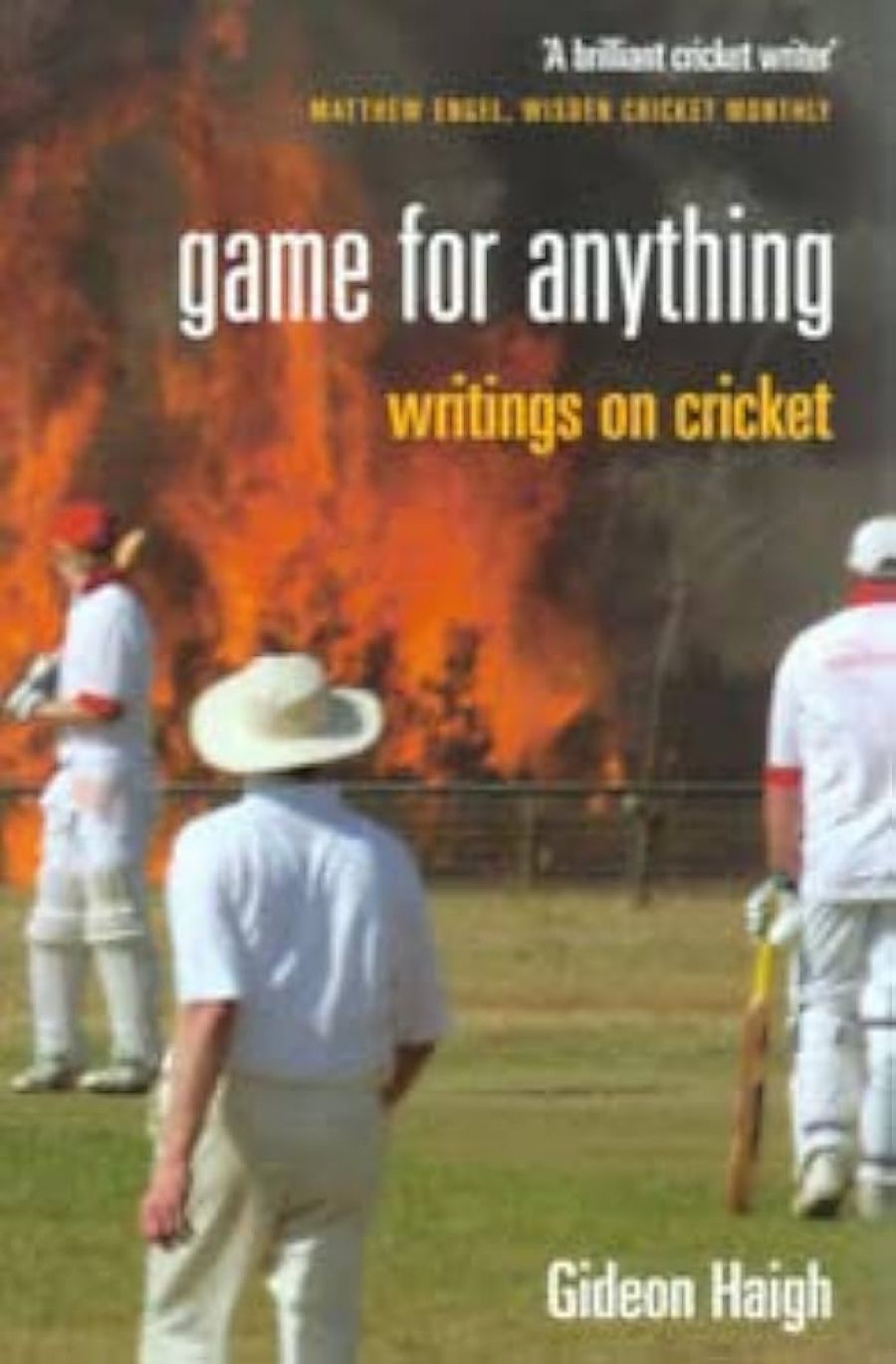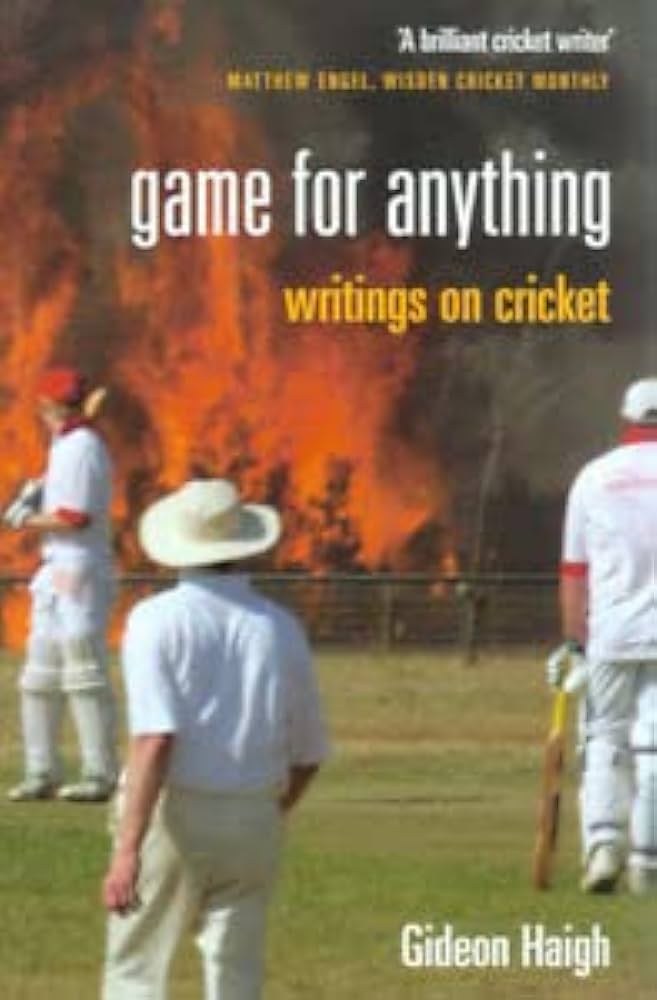
- Free Article: No
- Contents Category: Sport
- Review Article: Yes
- Article Title: At All Costs
- Online Only: No
- Custom Highlight Text:
Gideon Haigh likes cricket, literature and history, and his writings on cricket are accordingly shrewd, learned and illuminating. He writes particularly well of Jack Gregory and of George Headley. Gregory was the embodiment of the Anzac legend: tall, bronzed, blue-eyed, an artilleryman in the Great War. He played for an AIF eleven in England after the war, took dazzling close catches, demolished Cambridge University with ferocious fast bowling and went on to test match triumphs with Australia against Eng-land in the 1920s. Injuries that so often cut down bowlers of explosive pace curtailed his career. Headley, on the other hand, was a batsman in the early West Indian sides, a black man in teams of mixed race captained always by whites, representing a divided nation of particularist energies. Haigh writes with great understanding of the immense difficulty of maintaining form, as Headley did, in a team that always lost.
- Book 1 Title: Game For Anything
- Book 1 Subtitle: Writings on cricket
- Book 1 Biblio: Black Inc., $32pb, 336pp, 1 86395 309 4
- Book 1 Cover Small (400 x 600):

- Book 1 Cover (800 x 1200):

- Book 2 Title: The Best Australian Sports Writing 2004
- Book 2 Biblio: Black Inc., $24.95pb, 368pp, 1 86395 213 6
- Book 2 Cover Small (400 x 600):

- Book 2 Cover (800 x 1200):

The Headley story brings us close to the essential paradox of cricket: an individual game masquerading as a team sport. It is perhaps only in the camaraderie of the dressing-room that a team spirit arises – although, even there, at least one player, padded up for the fall of the next wicket, will be thinking of himself and not the team. It is not an accident that most of Haigh’s cricket writings are profiles of individuals. The profiles are very good. R.W. Wardill, Harry Trott, Reg Duff and Peggy Antonio, a remarkable woman cricketer of the 1930s, are beautifully celebrated. There is wit. Of the New Zealander John Wright’s memoirs, Haigh remarks, ‘few cricket autobiographies can have contained quite so many photographs of the author being bowled’. Comparing Wright to John Entwistle, however, seems a little strained: New Zealand’s cricket has never remotely resembled a concert by The Who.
Haigh’s vocabulary, like his similes, can sometimes intrude unnecessarily. An extensive vocabulary empowers a writer to express himself or herself with precision, but, like all powerful instruments, it can be misused. Game for Anything is marred periodically by ostentation. Must Haigh drop into Latin – ‘pace’ is a favourite – so often? Is it really necessary to say ‘autodidactic’ every time you mean ‘self-made’ or ‘self-taught’? Wouldn’t ‘commonplace’ do for ‘quotidian’? Haigh is a perceptive and intelligent writer, but, to illustrate, what service would it do the reader if I were to describe his excellent 1998 piece on Sir Donald Bradman as a ‘taxonomy of hagiography’?
Garrie Hutchinson is less magniloquent, although his prologue to The Best Australian Sports Writing 2004 twice employs the word ‘expunged’, which perhaps reveals the intensity of his grief over the end of the home-and-away era at Princes Park (Hutchinson supports Carlton in the Australian Football League). He alludes to the volcanically emotional Australian women’s rowing incident in the 2004 Olympic Games in well-chosen words: ‘Sally Robbins, the rower who gave up, or alternatively had given all she had, in the women’s eights final. What was worse, letting your mates down, or complaining about it? The Australian ethical compass doesn’t give much guidance in this.’
It certainly doesn’t, and what the following pages reveal is that, if Australia has an ethical compass at all, it is in urgent need of repair. Steve Waugh makes no apology for the graceless behaviour of the Australian cricket team, and Jacquelin Magnay tries to persuade us that innocent young Australian cyclists have been corrupted by cynical Europeans (‘even if the institute tries to quarantine itself from such murky practices, the cyclists are exposed to European ways from an early age’) in a piece that draws a baffling distinction between ‘acceptable ethical’ and ‘illegal cheating’ (implying that there is an unacceptable ‘ethical’ and such a thing as legal cheating).
The quality of The Best Australian Sports Writing 2004 varies considerably, from the sloppy, cliché-ridden and breathless (Leisa Scott on the sailor Adrienne Cahalan), the hasty and impressionistic (Philippa Hawker’s ‘Up Yours, Cazaly’) to the frustratingly unrealised (Carl Hammerschmidt’s pieces on surfing, which always seem about to be really memorable, but aren’t) and the genuinely compelling (Stuart Rintoul on John Landy, and Robert Drane on boxing). On the evidence of this book, the best Australian sports writing seems to be produced by Peter Lalor, who displays the increasingly rare ability to evoke without cliché.
Ian Hayward Robinson provides humour in ‘How I Got Mistaken for a Korean Olympian Because of My Bad French’, although, as the title indicates, he strains a little. His best line concerns the drinks on sale in the Olympic Village in Melbourne in 1956: Ovaltine, Milo, Cocoa and Bonox. ‘None of them had aggressive reptilian names ending in “ade”.’ Julian Savulescu and Bennett Foddy point out that, for all the sentimental talk about the nobility of competition, today’s professional athletes want and need to win – at all costs. The authors conduct an interesting discussion of the idea of competitive fairness. But their conclusion – that we should engineer fairness through doping – is rationalism gone mad.
Rationalism of the economic variety is forcing publishers to shed proof-readers and editors, and it shows in these titles. There are misspellings (‘sensorious’ for ‘censorious’), the omission of accents (‘lese-majeste’ for ‘lèse-majesté’) and so on. The errors do not render the books unreadable, but the effect is similar to that of the commercialisation of sport: it introduces a certain shabbiness.


Comments powered by CComment